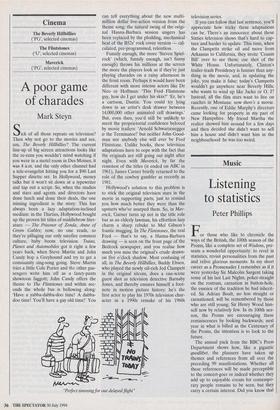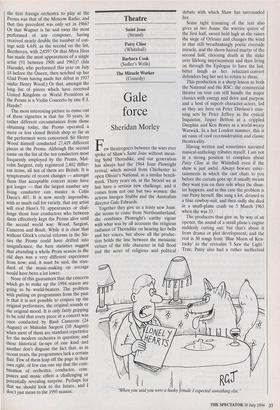Music
Listening to statistics
Peter Phillips
For those who like to chronicle the ways of the British, the 100th season of the Proms, like a complete set of Wisdens, pre- sents a wonderful opportunity: to revel in statistics, revisit personalities from the past and relive glorious moments. In my short career as a Promenader I remember as if it were yesterday Sir Malcolm Sargent taking some of his last Last Nights, poker-straight on the rostrum, carnation in button-hole, the essence of the tradition he had inherit- ed. Sir Adrian Boult, no less straight or carnationed, will be remembered by those who are still young; Sir Henry Wood him- self now by relatively few. In its 100th sea- son, the Proms are encouraging these reminiscences by looking backwards; next year in what is billed as the Centenary of the Proms, the intention is to look to the future.
The annual pack from the BBC's Press Department shows how, like a gigantic quodlibet, the planners have taken up themes and references from all over the preceding 99 manifestations. Whether all these references will be made perceptible to the concert-goer or indeed whether they add up to enjoyable events for contempo- rary people remains to be seen, but they carry a certain interest. Did you know that the first foreign orchestra to play at the Proms was that of the Moscow Radio, and that this precedent was only set in 1966? Or that Wagner is far and away the most performed of any composer, having received nearly double the number of out- ings with 4,449, as the second on the list, Beethoven, with 2,459? Or that Myra Hess has made the most appearances of a single artist (91 between 1908 and 1961)? (Ida Haendel, who performed this year on July 18 before the Queen, then notched up her 62nd Prom having made her debut in 1937 under Henry Wood.) Or that, amongst the long list of pieces which have received United Kingdom or World Premieres at the Proms is a Violin Concerto by one F.J. Haydn?
The most interesting picture to come out of these vignettes is that for 70 years, in rather different circumstances from those obtaining today, the Proms operated a more or less closed British shop so far as the performers were concerned. Sir Henry Wood himself conducted 27,419 different pieces at the Proms. Although the second name on the list of the ten conductors most frequently employed by the Proms, Mal- colm Sargent, only registered 2,402 differ- ent items, all ten of them are British. It is symptomatic of recent changes — amongst them that acceptable concert items have got longer — that the largest number any living conductor can muster is Colin Davis's 407. It is now surely impossible, with so much call for variety, that any artist will rival Hess's 91 appearances or chal- lenge those four conductors who between them effectively kept the Proms alive until the second world war: Wood, Sargent, Cameron and Boult. While it is clear that without Glock's crucial reforms in the Six- ties the Proms could have drifted into insignificance, the bare statistics suggest that attending a whole Prom season in the old days was a very different experience from now; and, it must be said, the stan- dard of the music-making on average would have been a lot lower.
None of this guarantees that the concerts which go to make up the 1994 season are going to be world-beaters. The problem with putting on programmes from the past is that it is not possible to conjure up the original performers, the original sounds or the original mood. It is only fairly gripping to be told that every piece in a concert was once conducted by Basil Cameron (24 August) or Malcolm Sargent (10 August) when most of them are standard repertoire for the modern orchestra in question; and these historical tie-ups of one kind and another don't disguise the fact that, as in recent years, the programmes lack a certain flair. Few of them leap off the page in their own right, of few can one say that the com- bination of orchestra, conductor, com- posers and music offers a challenging or Potentially revealing surprise. Perhaps for that we should look to the future, and I don't just mean to the 1995 season.



















































 Previous page
Previous page